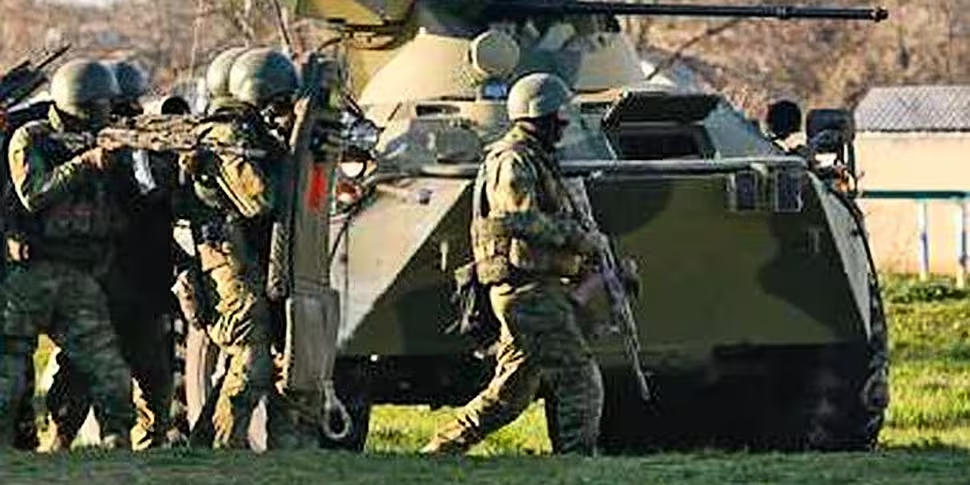Ukraine's Defence Ministry has been told to withdraw all its forces from the Crimean Peninsula, hours after Russian forces threw stun grenades and fired shots during their seizure of a navy base.
Ukraine's acting President said the Defence Ministry was given the order on Monday after Ukrainian troops lost control of one of their last remaining bases in the region.
Russian troops, backed by helicopters and armoured personnel carriers, forced their way into the base in Feodosia in the early hours of Monday morning.
Ukrainian Defence Ministry spokesman Vladislav Seleznyov said "The invading troops were using stun grenades and also firing automatic weapons...The interior of the compound is full of Russian troops".
In a statement on his Facebook page, Mr. Seleznyov added that paratroopers descended into the base from four helicopters hovering above. He said three Russian vehicles were then seen leaving the base with Ukrainian marines whose hands had been tied up.
Daily Telegraph journalist Roland Oliphant is in Crimea. He told Newstalk Breakfast earlier that these developments are another sign of dwindling Ukrainian power there.
Ukrainian army officer, First Lieutenant Anatoly Mozgovoy, confirmed shots were fired at unarmed Ukrainian soldiers during the seizure, however there are currently no reports of any injuries.
The Feodosia base had been one of the last few military facilities still flying Ukrainian flags after Russia's annexation of Crimea. Those flags have now reportedly been removed.
Fears of further Russian moves
Russian troops violently flushed out other remaining pockets of Ukrainian military influence in Crimea on Saturday, smashing armoured vehicles through the walls of Belbek air force base in a swift takeover.
As G7 leaders prepare to discuss the crisis at a summit, headed by US President Barack Obama, NATOs top commander in Europe has warned that Russia's military force massing on Ukraine's border was "very, very sizeable and very, very ready".
General Philip Breedlove said he was worried the Russian military could make a move for Moldova's breakaway Transdniestria region.
"There is absolutely sufficient force postured on the eastern border of Ukraine to run to Transdniestria if the decision was made to do that and that is very worrisome" he said.
Transdniestria, a narrow strip of land to Ukraine's southwest, already has a Russian military presence and most people there favour a union with the country.
White House deputy national security adviser Tony Blinken echoed the suggestion that President Putin could be plotting further action.
"It's deeply concerning to see the Russian troop build-up on the border" he told CNN.
"It creates the potential for incidents, for instability. It's likely that what they're trying to do is intimidate the Ukrainians. It's possible that they're preparing to move in".
Russian President Vladimir Putin last week signed papers making Crimea part of Russia, saying it was complying with international agreements and had no plans to invade.
It has also called the soldiers who took over Ukrainian bases in Crimea "self-defence forces". Most experts agree there is no way of winning back Crimea from Russia.
Former Taoiseach and EU Ambassador to the United States, John Bruton, says other areas of eastern Europe are also under threat.
Emergency G7 meeting
Today leaders of the G7 nations will hold emergency talks on the crisis on the sidelines of a nuclear security summit in The Hague.
The US and European Union have already targeted some of Mr. Putin's closest political and business allies with personal sanctions and have threatened broader economic sanctions if his forces encroach on other parts of Ukraine with large Russian-speaking populations.
Germany, which has close trade ties with Moscow, said the EU was united in its readiness to impose sanctions on Russia if necessary.
"None of us wants to escalate, but if Russia changes things unilaterally, then it must know that we won't accept it and that relations will be bad," German Finance minister Wolfgang Schaeuble said.
Belarusian President Alexander Lukashenko, a close ally of Russia, accepted that Crimea was now "de facto" a part of Russia, but said the annexation set a "bad precedent".
Paul Rogers is Professor of Peace Studies at Bradford University in the UK. He spoke to Newstalk Breakfast earlier.










